P-39N Airacobra
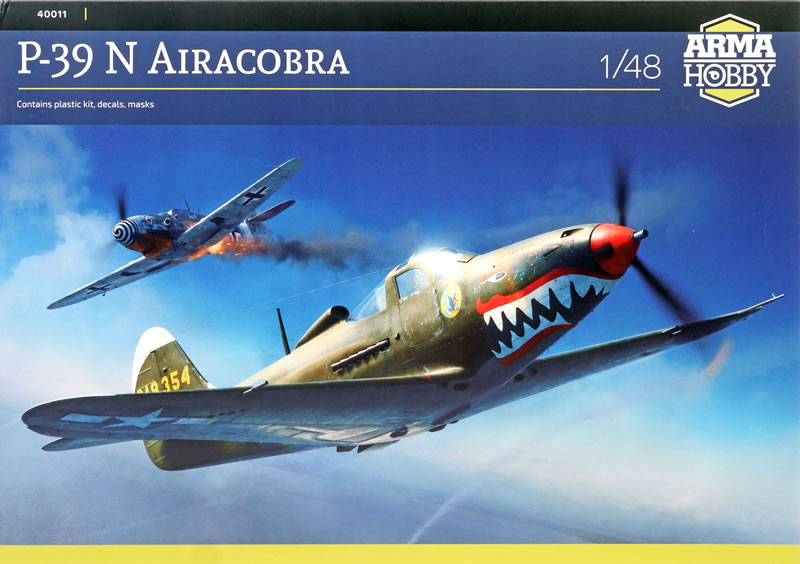
Arma Hobby, 1/48 scale
S
u m m a r y : |
Description and Item No.: |
Arma Hobby Kit No. 40011 - P-39N Airacobra |
Contents and Media: |
85 parts in grey plastic; two parts in grey coloured 3d printed resin; six parts in clear plastic; three chrome balls; yellow Kabuki die-cut self-adhesive paper masks; decals for three marking options. |
Price: |
€34.36 plus shipping available online at Arma Hobby
£35.99 UK Price (£30.00 Export Price) Plus Shipping at Hannants
and hobby retailers worldwide |
Scale: |
1/48 |
Review Type: |
First Look |
Advantages: |
High quality moulding; gorgeous surface textures and detail; parts supplied for P-39D/P-400 to P-39N and Q variants; many useful options including gun pods, bombs and drop tanks; poseable canopy doors; high quality Cartograf decals. |
Disadvantages: |
None noted. |
Recommendation: |
Arma Hobby's follow-up 1/48 scale Airacobra, the P-39 N, is a gorgeous kit with its crisp surface textures, high moulding quality, thoughtful parts breakdown, useful options and very high level of detail. Although not all the options on the sprues are mentioned in the intructions, you will be able to build P-39D/P-400 to P-39N and Q variants straight from the parts in the box. It's nice to see that Arma has addressed the sink marks on the top of the wings too. This is a another excellent offering from Arma Hobby. |
Reviewed by Brett Green

The Bell P-39 Airacobra was a fighter produced by Bell Aircraft for the United States Army Air Forces during the Second World War. It was one of the principal American fighters in service when the United States entered combat.
It had an unusual layout, with the engine installed in the center fuselage, behind the pilot, and driving a tractor propeller in the nose with a long shaft. It was also the first fighter fitted with a tricycle undercarriage. Although its mid-engine placement was innovative, the P-39 design was handicapped by the absence of an efficient turbo-supercharger, preventing it from performing high-altitude missions. It was therefore rejected by the RAF for use over western Europe but adopted by the USSR, where most air combat took place at medium and lower altitudes.
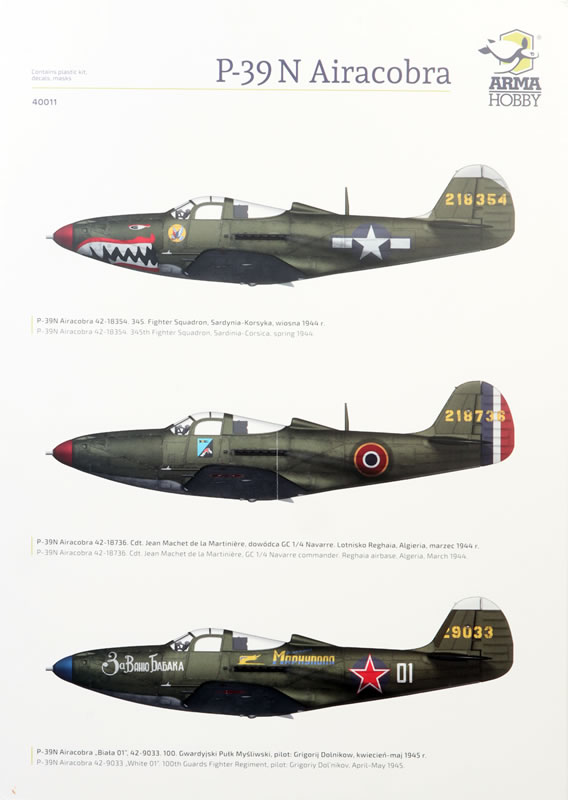
Soviet pilots scored the highest number of kills in the P-39 attributed to any U.S. fighter type flown by any air force in any conflict.
Other major users of the type included the Free French, the Royal Air Force, and the Italian Co-Belligerent Air Force.
* Historical background adapted from Wikipedia
Arma Hobby recently launched their all-new 1/48 scale Airacobra family with Kit No. 40010, the P-39Q. This kit sold out quickly, so hot on its heels Arma has released Kit No. 480011, the P-39N Airacobra.
The box title sells the contents short though, as parts for the P-39D/P-400 to P-39N and Q are all on the sprues.
Arma Hobby's 1/48 scale Bell P-39Q Airacobra comprises 85 parts in grey plastic, two parts in grey coloured 3d printed resin, six parts in clear plastic, three chrome balls, yellow Kabuki die-cut self-adhesive paper canopy masks and decals for three marking options.
The grey plastic parts are delivered on three sprues. Moulding quality is generally excellent.
The P-39Q kit suffered from three sink lines on the upper surface of the wings but that issue seems to be addressed with this issue.
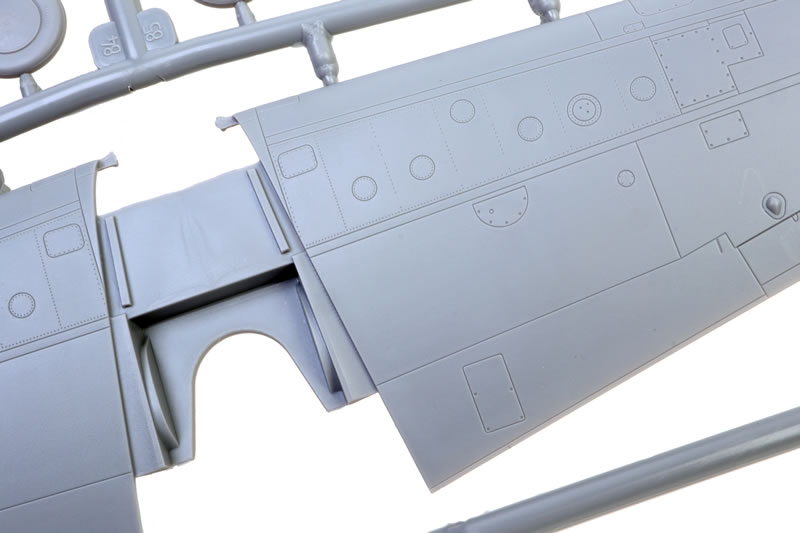
The plastic parts otherwise boast a lovely smooth texture.
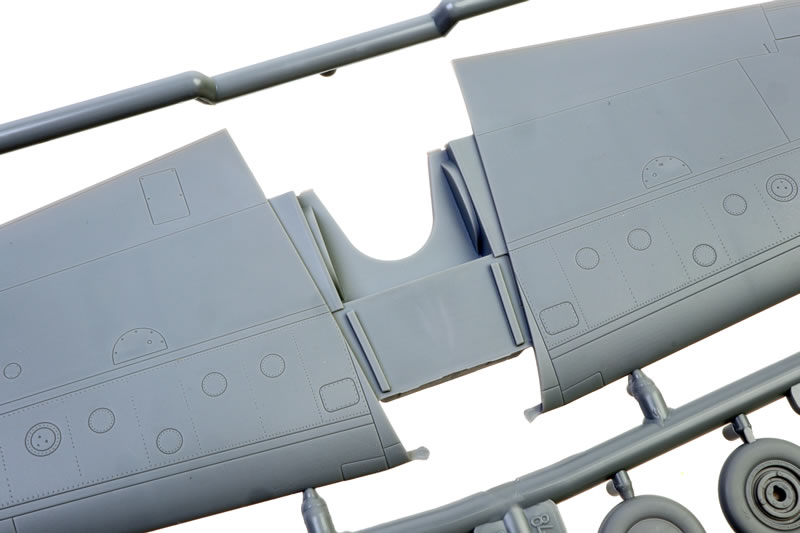
Being a long-run kit, the parts are moulded with all the alignment aids that you would expect including pins, holes, slots and tabs.
Moulding quality is excellent. So far I have only found one ejector pin circle and that is only on the inside of an undercrriage door.
Some of the sprue attachments are moulded to the surfaces of the kits so take care when cutting these off and cleaning them up.
Surface textures are just gorgeous. Recessed panel lines, circular fastener heads and other structural details are very fine.
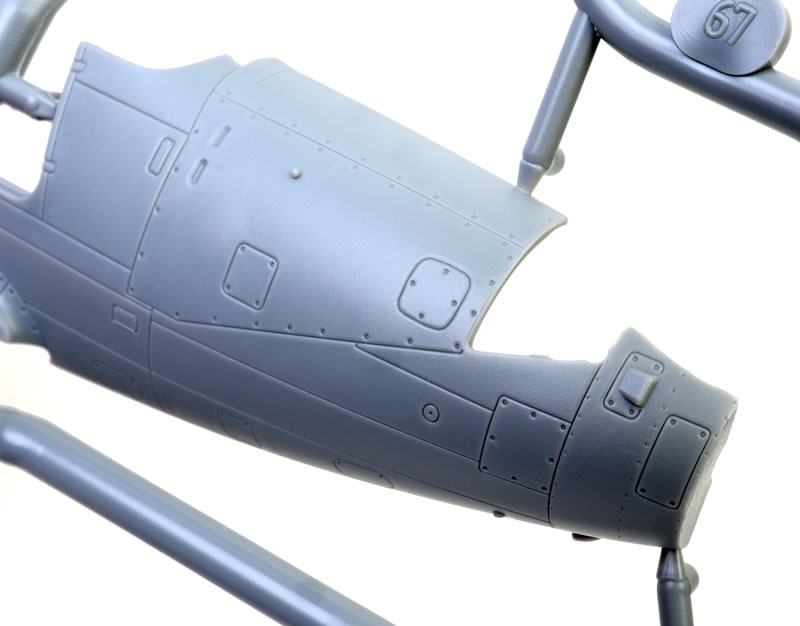
The fuselage is supplied as left and right halves with a few elements that allow some important options.
The most obvious is the forward upper gun cowl panels. Three styles are included with subtle variations.
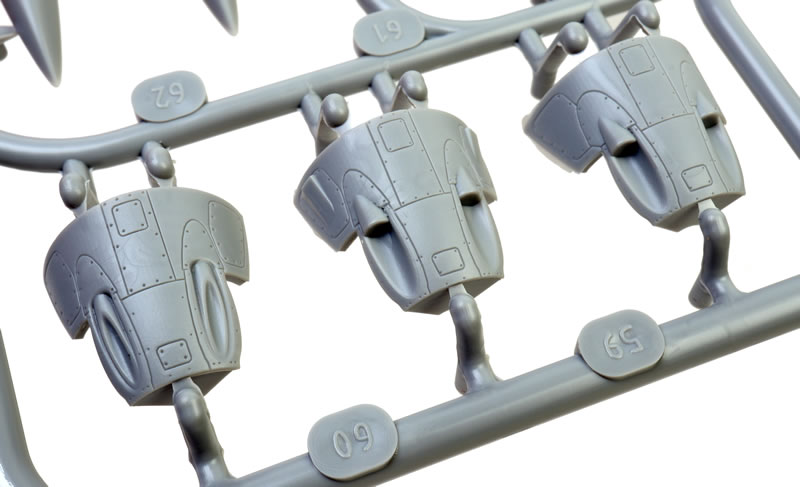
Some cockpit structural detail is moulded directly to the inside of the fuselage halves. Additional separate parts include a plastic cockpit floor, throttle quadrant; instrument panel, a moulded pair of rudder pedals, control column, radios and more.
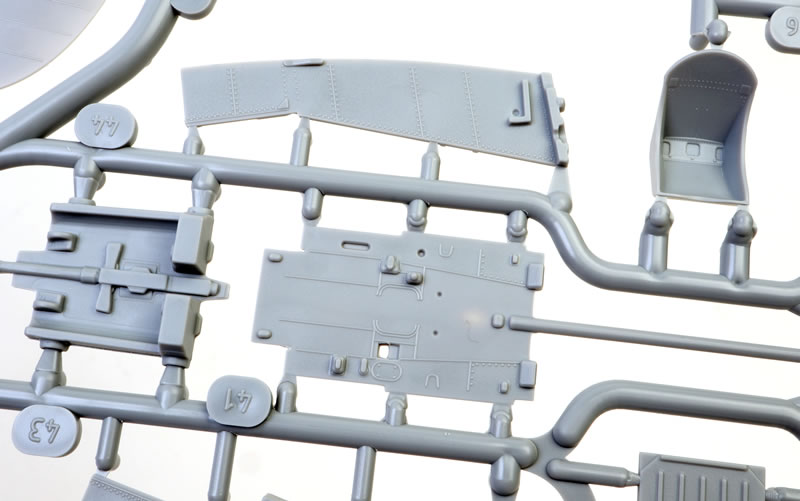
The instrument panel features raised detail that will respond well to careful dry brushing.
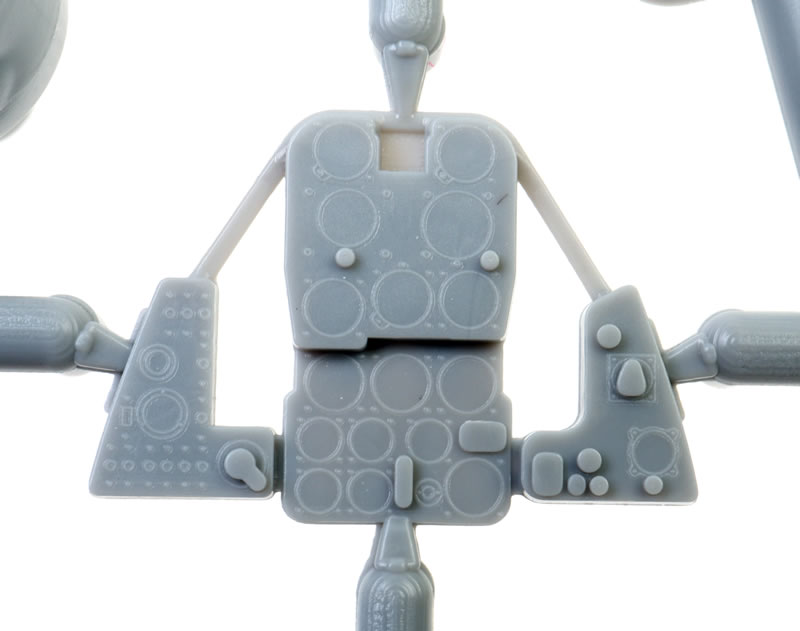
There are some really nice plastic details in the cockpit too.
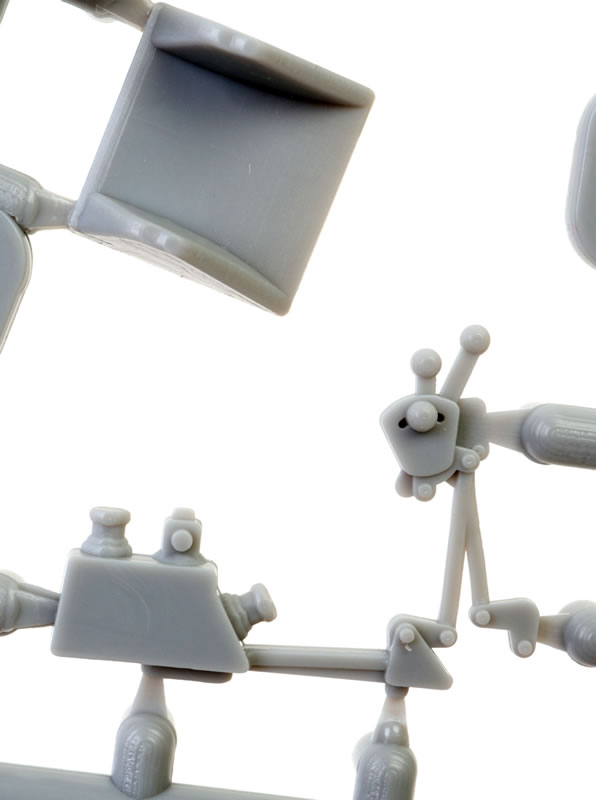
As an alternative, an overlay decal is supplied for the instrument panels and switch panel. Harness strap decals are included as well.
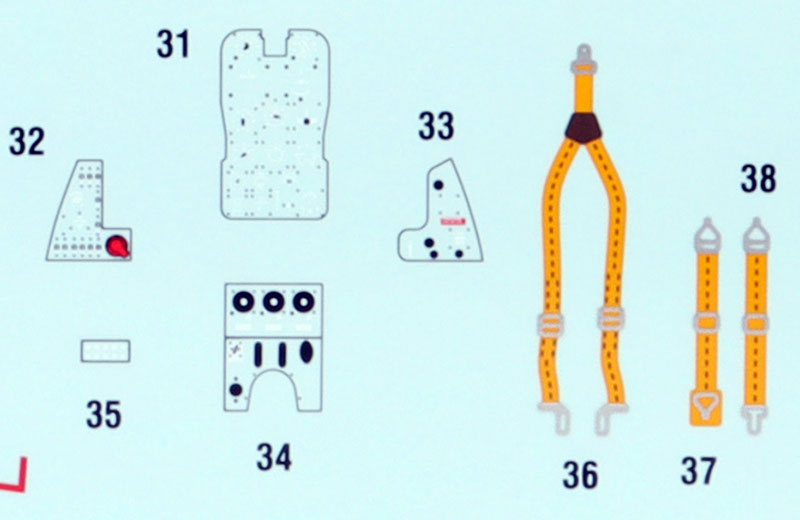
Three chrome metal balls are supplied as nose weight. These are placed into recesses above the front landing gear bay.
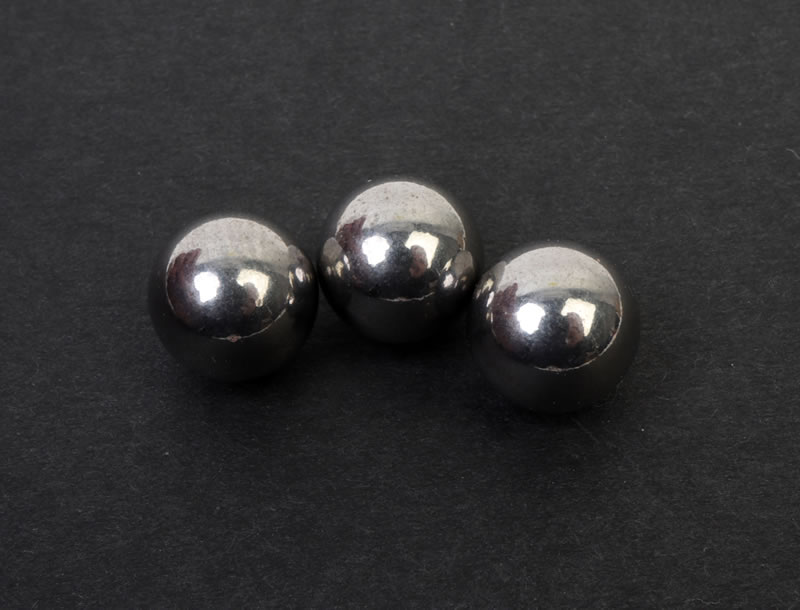
Three styles of exhaust are supplied. These are moulded as one-piece per side. The ends are moulded solid.
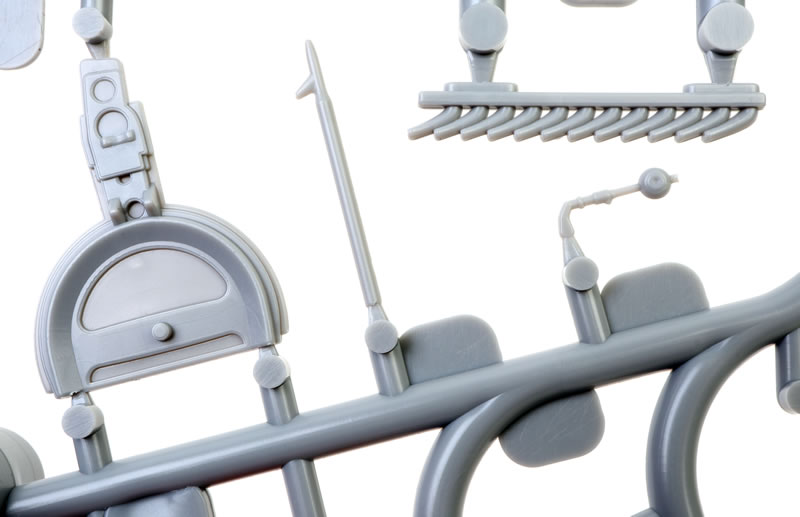
The wing parts are full span lower and upper halves. They are suitably thin at the trailing edges. Aileron hinge lines are appropriately heavier than the general panel line detailing.
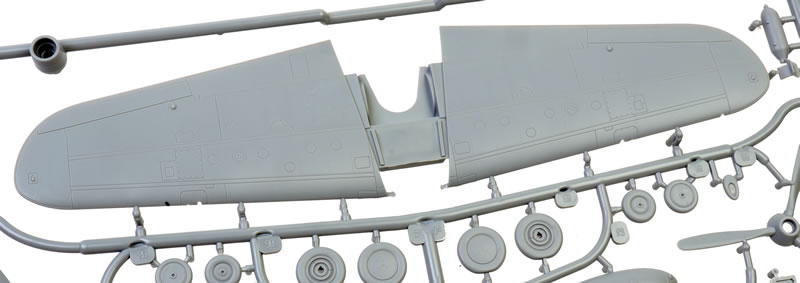
The wheel wells are nicely detailed between the upper wing halves. The are presented as one piece each and feature very fine raised letter on the sidewalls. Tyre tread is smooth. The wheels are subtly bulged and flattened.
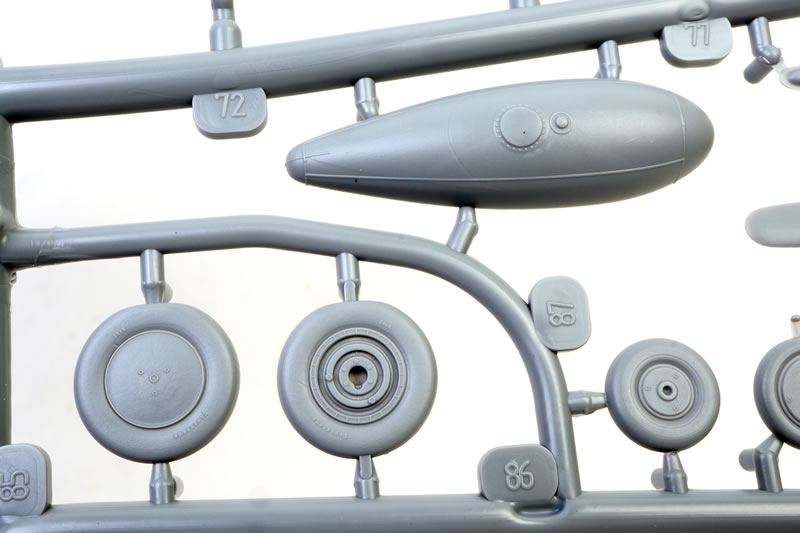
Elevators and rudder are separate parts and may be posed to taste.
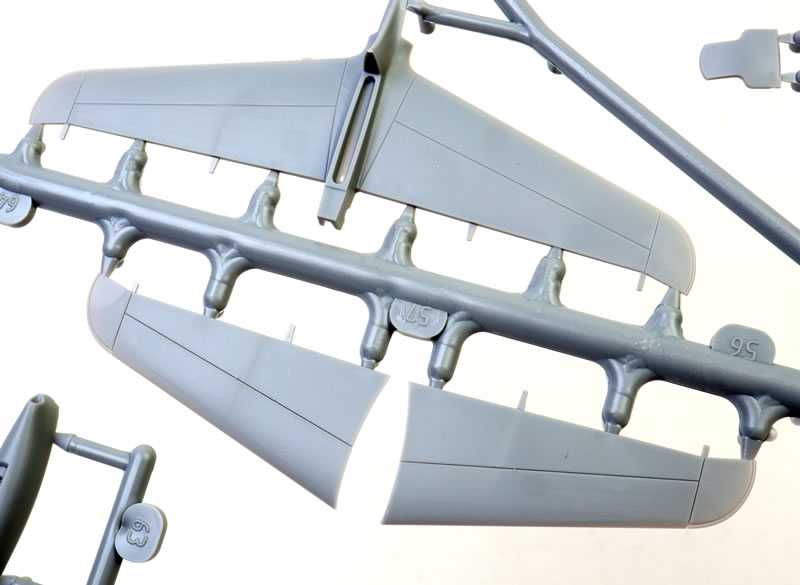
The tail wheel and strut are moulded as a single part. Detail looks good.
Ordnance includes two underwing gun pods, a drop tank and 250 lb bombs.
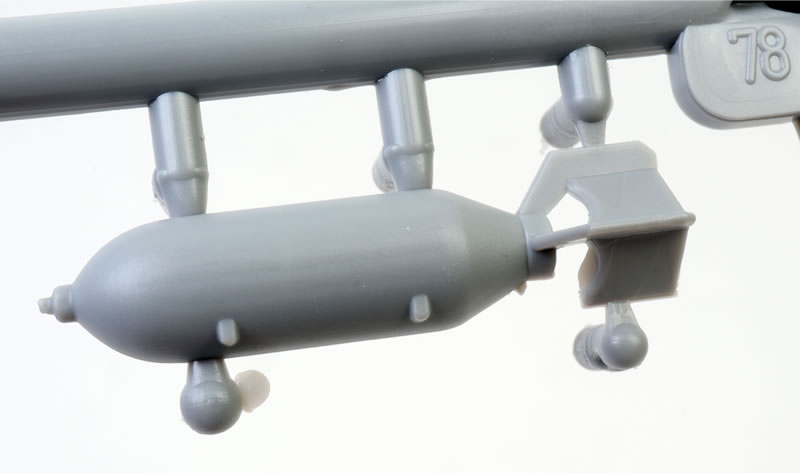
There are two tiny 3d printed parts that represent forward fuselage air vents.
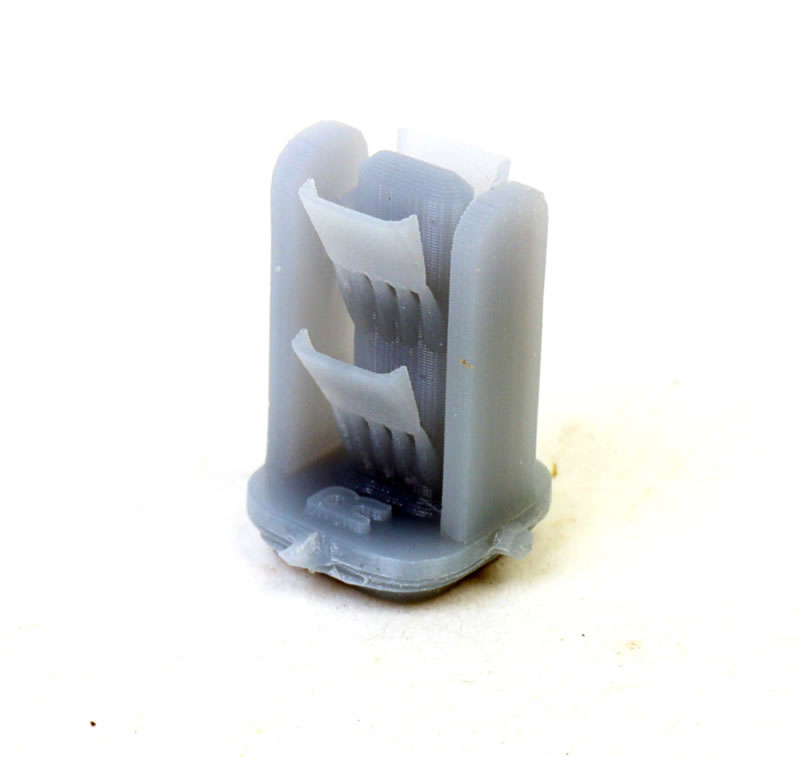
The canopy parts are thin and clear.
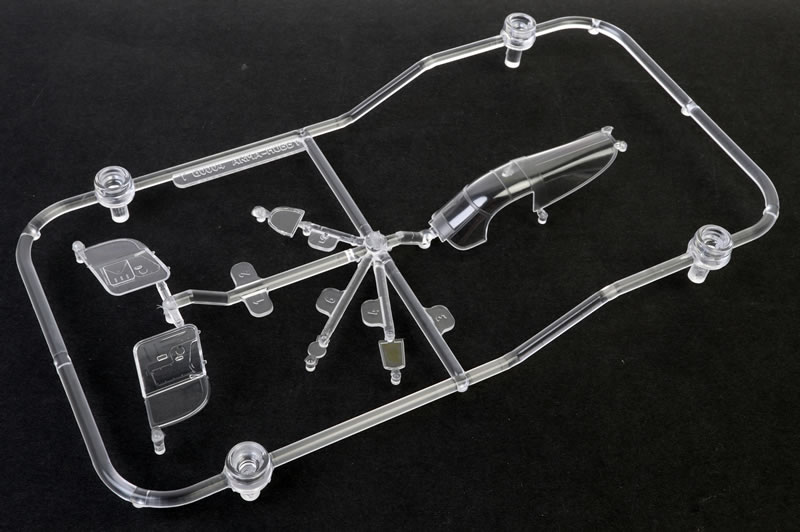
The two side doors are moulded as clear parts. They may be posed open or closed. Note that pilot entry and egress was usually from the starboard side. Self-adhesive die-cut masks are supplied for the canopy and doors. This is a thoughtful and time saving touch.
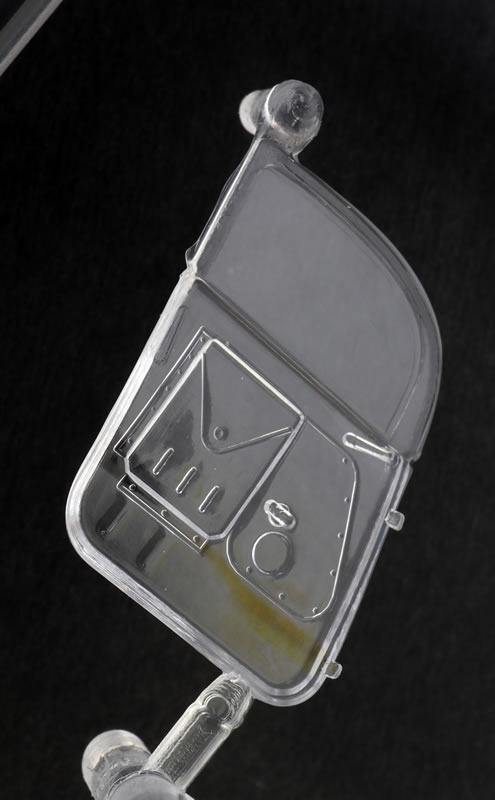
A number of additional parts and unused options are included on the sprues.
Instructions are supplied as a 12 page stapled A5-sized booklet.
The kit is packed into a end-opening cardboard box with a thicker cardboard tray inside. This is very robust.
Marking Options
The kit decal sheet offers markings for three options with some colourful markings variations in camouflage and service nationality.
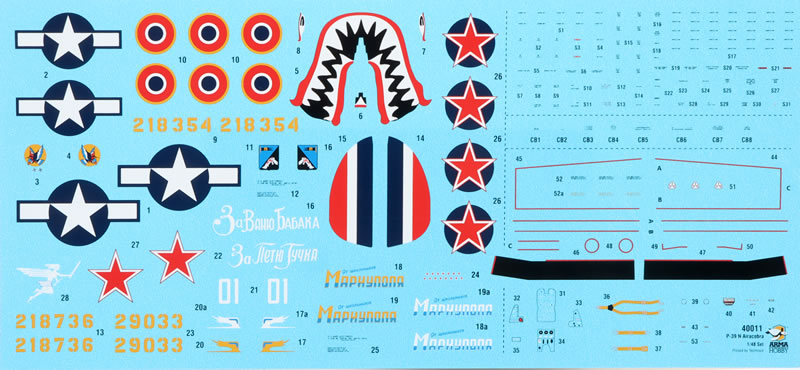
They are:
-
P-39N Airacobra 42-18736. Cdt. Jean Machet de la Martinière, GC 1/4 Navarre commander. Reghaia airbase, Algeria, March 1944.
-
P-39N Airacobra 42-18354. 345th Fighter Squadron, Sardinia-Corsica, spring 1944.
-
P-39N Airacobra 42-9033 „White 01”. 100th Guards Fighter Regiment, pilots: Ivan Babak and Grigoriy Dol’nikov, 1943-1945 (two wariants)
Stencil markings are printed on the same single sheet, as are propeller logos and wing walk markings.
Decals are printed perfectly by Cartograf.
They are glossy, colours are well saturated and everything is in perfect register.
Arma Hobby's follow-up 1/48 scale Airacobra, the P-39 N, is a gorgeous kit with its crisp surface textures, high moulding quality, thoughtful parts breakdown, useful options and very high level of detail.
Although not all the options on the sprues are mentioned in the intructions, you will be able to build P-39D/P-400 to P-39N and Q variants straight from the parts in the box.
It's nice to see that Arma has addressed the sink marks on the top of the wings too.
This is a another excellent offering from Arma Hobby.
Thanks to Arma Hobby for the sample
Review Text and Images Copyright © 2024 by Brett Green
Page Created 27 August, 2024
Last updated
27 August, 2024
Back to HyperScale Main Page
Back to Reviews Page |
Home
| What's New |
Features |
Gallery |
Reviews |
Reference |
Forum |
Search